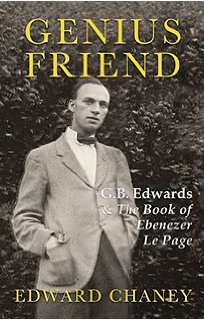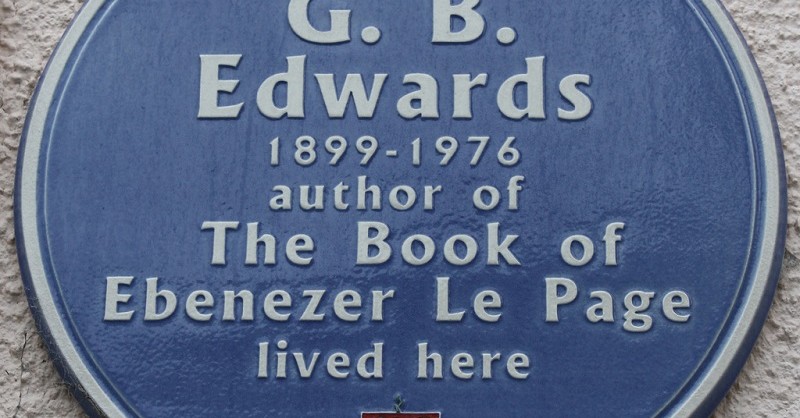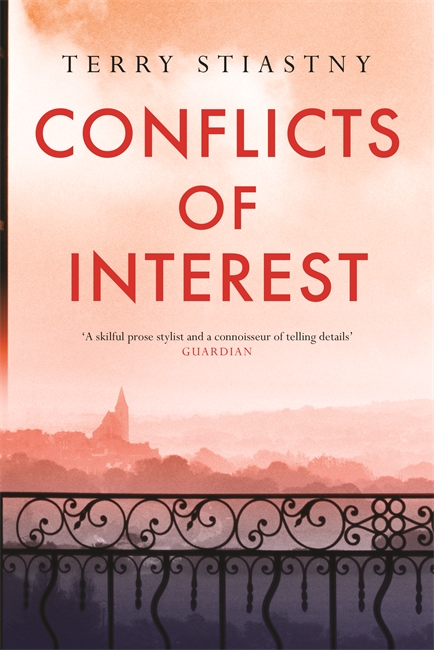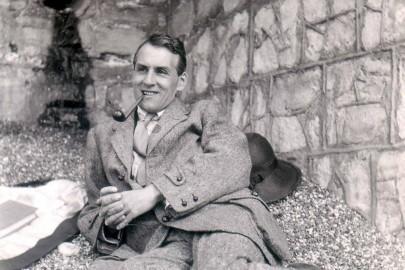Having recommended the remarkable novel The Book of Ebenezer Le Page in our 1p Book Review feature, Nige enjoys the story of its mysterious author in a new biography…
It’s a great story: a young art student comes across an elderly man who is living a reclusive life in a seaside town. They become friends, and the young man learns that this mysterious recluse has some kind of literary past, and that he has a long unfinished novel that he’s more or less given up on. With the young man’s encouragement, he finishes it and bequeaths it to the young man, who makes several abortive attempts to get it published. Finally, after the old man has died, he succeeds, the book comes out – and is instantly hailed as a classic of 20th-century literature. That is the story of The Book of Ebenezer Le Page, its obscure author G.B. (Gerald) Edwards, and the young man who befriended him, Edward Chaney, now a Professor of Fine and Decorative Arts. Genius Friend is his biography of Edwards, and his personal account of how he got to know Edwards and how The Book of Ebenezer Le Page came to be published. For those who haven’t read it (i.e. most people – despite the critical acclaim, it’s never quite been in the literary mainstream), I should explain that The Book of Ebenezer Le Page is presented as the autobiography of a Guernsey tomato grower and fisherman who has only once in his life left his home island (to visit Jersey) and has lived through a great many family dramas, the Nazi occupation of his beloved island, and the postwar changes that have, in his view, ruined it. The voice of Ebenezer is quite unique and strangely beguiling, and the book as a whole is entirely unlike any other. Though some – I’m one of them – find the ending disappointingly sentimental, all that leads up to is gripping, intimate, involving and altogether extraordinary, a true one-off. But what of its author, that ‘cryptic and mystifying man’, as Richard Davenport-Hines described him? Chaney’s biographical researches reveal a tale of promise unfulfilled. Coming to London from Guernsey at the end of the Great War, Edwards was a rising star of the literary scene of the Twenties and Thirties. He was the admired friend of, among others, Middleton Murry, John Stewart Collis (who called him ‘our genius friend’) and Stephen Potter, all of whom were to some extent mesmerised by him, and all of whom expected great things of him. Yet somehow the great things never materialised; Edwards procrastinated, failed to finish projects, and alienated his friends, who finally gave up on him, tired of his ‘lofty, preaching tone’ and failure to deliver on his apparent promise. Edwards was a worshipper of D.H. Lawrence and a lifelong believer in a kind of Nietzscheanism filtered through the utterances of the Lawrences, D.H. and Frieda. He was also susceptible to other cranky fads of his time, especially communal living and ‘free love’. Some section titles from Genius Friend give the flavour: Nietzschean Matrimony, Friedian [from Frieda] Philosophy, Lawrentian Flüellen, Asconan Theosophy Along the way there were restless Continental wanderings, often in the steps of the revered DHL – and Edwards got married, pursuing an ‘open marriage’ and fathering at least some of the children his wife gave birth to. When the marriage, unsurprisingly, broke up, Edwards abandoned the family, seeing little or nothing of them over the coming years. For a while he worked on the Mass Observation project in Bolton, where he also directed stage plays. He makes an (anonymous) appearance in the official history of Mass Observation, where he is described, intriguingly, as ‘a gay man of morose disposition from Guernsey’. Around this time, Edwards began his long descent into obscurity, leading a rootless and apparently unproductive life, having no contact with his former life and his former literary friends and mentors, and becoming increasingly moody, misogynistic and cantankerous, though still capable of exerting charm. By the time he met the young Edward Chaney in 1972, the descent was complete – but so too, nearly, was The Book of Ebenezer Le Page… Chaney’s biography is a heroic feat of research and contains probably as much as is ever going to be known about the mysterious Edwards. It is copiously illustrated with photographs (some of them identity cards from the Nazi occupation of Guernsey – and one of them the author’s wedding photograph) and festooned with long footnotes. Chaney – who is not one to resist the chance to digress or slip in a little extra information – has assembled an impressive body of material. He does an excellent job of teasing out the complex connections between Edwards’s own life on Guernsey and that of Ebenezer Le Page, and he writes interestingly on the parallels between G.B. Edwards and Giuseppe Tomasi di Lampedusa, another lover of his native island who produced a unique late-life masterpiece (The Leopard). However, the central mystery remains: how did the Edwards we meet in the Twenties and Thirties – a rather unattractive figure, it has to be said – become the man who wrote The Book of Ebenezer Le Page? It was a mystery even to Edwards himself, who wrote, on re-reading his novel, that it ‘might have been written by somebody else’. What happened in his long ‘wilderness years’ that somehow fired him to write his masterpiece? Where did the unique voice of Ebenezer, and the torrential narrative flow of the novel, come from? Genius Friend is in effect the tale of two G.B. Edwardses – the young ‘genius friend’, and the man who wrote Ebenezer Le Page. There seems no continuity between them, no bridge across the wilderness of his later years. Perhaps another biography might come along one day that makes a more coherent picture of Edwards, but it’s hard to see how. Whoever attempts it will certainly have a trove of material to work with, thanks to Chaney’s tireless efforts. Meanwhile, there’s always The Book of Ebenezer Le Page. If you haven’t read it – do.  Genius Friend: G.B. Edwards and The Book of Ebenezer Le Page by Edward Chaney is published by Blue Ormer.
Genius Friend: G.B. Edwards and The Book of Ebenezer Le Page by Edward Chaney is published by Blue Ormer.













The foreword to the edition I had made Edwards sound odd. I remember a quotation from him about a lifelong struggle against the “female will”, in contrast to the apparently OK “feminine nature”. Nietzcheian Matrimony and Lawrentian Fluellen by themselves sound worth the price of the book…
Yes indeed – Edwards described his relationship with his mother as a ‘fight to the death’ and was outspokenly misogynistic. A troubled man – troubled in a way that made him open to all sorts of Lawrentian/Nietzchean nonsense. As Jeeves said of Nietzsche, ‘Fundamentally unsound, sir.’